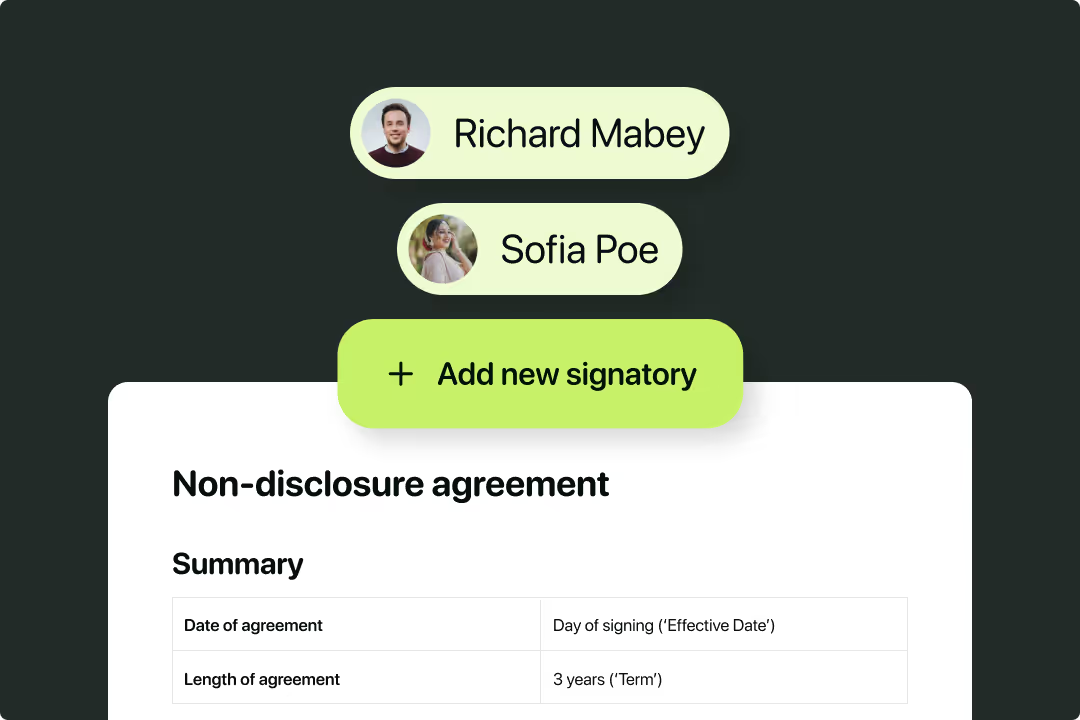Solutions
Customer Support
Resources
A contract management strategy is a plan or process to improve the way your organization manages contracts. Your contract management strategy defines what approach you will take to managing contracts right throughout their lifecycle - from drafting to execution and tracking.
Your strategic approach to contract management can change over time, with the introduction of generative AI and contract automation enabling organizations to create and agree contracts faster and more efficiently than ever before.
It’s also important to understand that a business can have numerous different strategies as part of its wider contract management process. Each of these strategic decisions and optimizations work together to make a better process overall.
Any individual or business managing multiple contracts a month will benefit from having a contract management strategy.
Whether you're a small startup managing a handful of supplier contracts, a mid-size organization handling hundreds of employment offer letters, or a multinational corporation dealing with thousands of contracts across various jurisdictions, a robust contract management strategy is crucial.

Contract management strategy isn't only beneficial for the business sector, though. A strong contract management strategy is equally important for non-profits, governmental bodies, educational institutions, and healthcare providers, among other organizations.
A carefully considered contract management strategy is important because it provides structure and discipline to what can otherwise be a messy process.
In fact, EY recently reported that 57 per cent of business development leaders have witnessed slower revenue as a result of inefficient contracting processes. It’s easy to see how this can happen, with friction throughout the contract lifecycle slowing down the sales process for businesses and directly impacting revenue figures as a result.
But an effective contract management strategy isn’t just important for increasing revenue. It’s also a great way to cut costs, too. By reducing the amount of manual admin work involved in the contract management process, you’ll reduce the need to grow your headcount to meet this administrative demand.
Before you can set up your contract management strategy, you’ll need a good understanding of how your contracting process works at present, and which problems need solutions.
One way to do this is to run a contract healthcheck. Alternatively, you can just ask your team which pain points they’re encountering and where friction most commonly occurs.
These insights should help you to identify your focus areas and plan a strategy around them.
If you’re stuck for inspiration, we’ve listed some of the best contract management strategies for 2026, taking all of the latest innovations and challenges into account.
We’ve also included some expert comments from businesses that already have these contract management strategies in place.
Leverage automated templates
One of the best contract management strategies is to automate your contract creation process. There are a few ways you can do this.
Firstly, you can use a contract automation solution like Juro where contract templates are automated and can be populated in seconds using data from a simple Q&A form or via an integration with another business tool.

The other option is to use generative AI to draft contracts. This is called AI contract drafting and it enables individuals to generate contracts in seconds using a prompt.
Adopting this contract management strategy can benefit businesses in several ways.
Firstly, it makes the entire process of creating a contract much faster, allowing teams to get contracts sent out to prospects quickly. Secondly, the automation process empowers commercial teams to self-serve on contracts, rather than waiting on legal to draft the terms.
Another great contract management strategy is to centralize your contract storage. Lots of businesses are already storing their contracts on shared drives. However, this isn’t the same as having a data-rich contract repository where contracts are fully searchable and better organized.
While contracts can be uploaded and stored on shared drives, it’s often difficult to find the contract you need in the sea of other contracts. It’s also difficult to control who has access to which contracts without doing this on a document-by-document basis.
By comparison, a robust contract storage solution like Juro can give you instant access to all of your contracts and their data. Juro’s repository was designed specifically for contracts, offering granular permissions, separate workspaces, and OCR-enabled search functionality to make querying contracts easier.
{{quote1}}
Find out more about how the legal team at Paddle centralized their contract storage in this case study.
Making your contract management process more collaborative is another great strategy for getting contracts created and agreed faster.
Traditionally, contract drafting was a task reserved for legal teams. But this meant that lean legal teams who are already buried in low-value work had a large backlog of contract requests. This resulted in lengthy (and costly) delays in the contracting process.
In a more collaborative workflow, commercial teams are empowered to self-serve on contracts. They can generate contracts as and when they need them, and on terms pre-defined by legal.
Juro’s collaborative workspace enables businesses to define approval workflows, review and comment on contracts in real-time, and track all of the changes made to a contract at a granular level. This makes it quicker and easier for teams to share, review, approve and finalize contracts.
{{quote2}}
Discover how Juro’s collaborative contract management tool enabled Koombea to streamline collaboration and approve contracts in seconds in this case study.
Integrations with other business tools allow teams to automate even more routine contract admin. Connecting your contract management software with a CRM, HRIS or ATS, enables businesses to sync data between the two systems seamlessly.
For example, Juro’s integration with Salesforce allows sales reps to populate the contract template they’re using with the data stored in a Salesforce opportunity record. This eliminates the need for manual data entry and empowers salespeople to focus on closing - not contract admin.

There will naturally be a lot of recurring questions your legal team receives about contracts, from when they can change the standard terms to which versions of a template should be used and when. Developing a contract playbook allows legal teams to answer these questions just once. They can codify all of the rules around contract creation and negotiation, making them easier for other teams to find and understand.
If you want to reduce contractual risk further, you can even automate this contract playbook and pre-define certain workflows for certain contracts. Again, this is a common use case for Juro. Juro users can bake certain rules and conditions into contracts, allowing legal to pre-emptively determine when deviations can occur and which elements of a contract can be changed.
The result? Fewer contracts need to be reviewed manually by legal because there are already safeguards in place.
{{quote3}}
We know what you’re thinking. That sounds like a lot of work and a lot of change. So, where do you start and what should you actually prioritize from that list?
Well, the common theme in all of these contract management strategies is that businesses can leverage technology to make the entire contract process faster, more efficient, and easier for their teams.
With an all-in-one contract management solution like Juro, you don’t have to choose which contract management strategy to implement first. Juro enables you to do all of the things we just described with one simple tool.
With Juro, businesses can create, execute and manage contracts 10x faster than traditional tools. This means faster contracting processes and less friction. Your teams can automate routine contract admin tasks and focus on higher-value projects. This is the single most impactful strategy your business can adopt in a world that's asking people to do more with less.
To find out more about Juro's powerful contract management solution, fill in the form below.

Lorem ipsum dolor sit amet, consectetur adipiscing elit. Suspendisse varius enim in eros elementum tristique. Duis cursus, mi quis viverra ornare, eros dolor interdum nulla, ut commodo diam libero vitae erat. Aenean faucibus nibh et justo cursus id rutrum lorem imperdiet. Nunc ut sem vitae risus tristique posuere.

